From protecting to continuing tradition, Bruce Ingram walks us through excellent reasons to keep a rooster as part of your flock.
Roosters absolutely fascinate me. Yes, I know hens and their eggs and/or meat are the reasons many folks raise chickens. But roosters add passion, personality, and, well, paternity, to any flock. Here are reasons to consider owning a rooster or two– provided local ordinances allow one where you live.
Roosters Make Excellent Watchdogs
No one drives or walks down our driveway without our two heritage Rhode Island Red roosters, Don and Friday, crowing. In fact, I believe that five-year-old Don can even distinguish my wife Elaine’s and my cars from those of strangers. For example, if he sees one of us drive down his driveway, he only crows once, letting us know that he’s on the job. If a strange vehicle travels past him, he emits a thunderous volley of screeches.
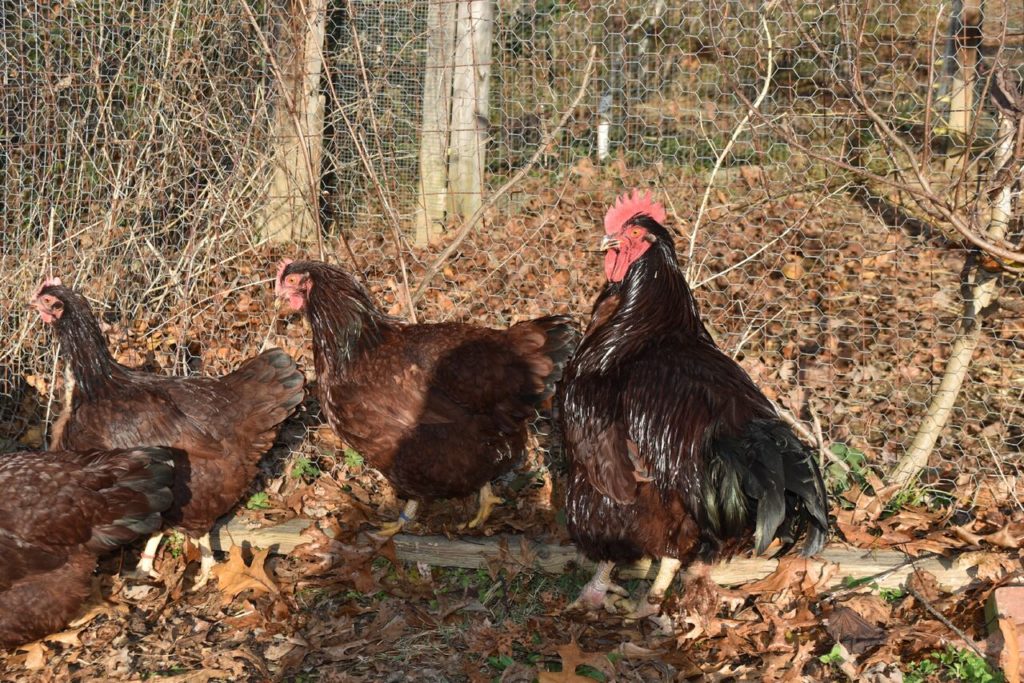
Don watching over his flock, ever ready to give the alarm.
Conversely, Friday, barely past the cockerel stage, crows indiscriminately non-stop at anything that passes down the driveway. In any event, we always know when someone has come to visit us.
A Rooster Crowing Celebrates Rural America
We live in a rural part of Southwest Virginia, and every morning we awake to the sounds of our two roosters crowing. In fact, as soon as we turn the light on in our bedrooms, both boys erupt from their respective henhouses. It’s as if they are communicating that if you folks have arisen, it’s time for us to rise and shine, too. When we go outside to release, feed, and water our birds, we can hear roos up and down our valley greeting the dawn.
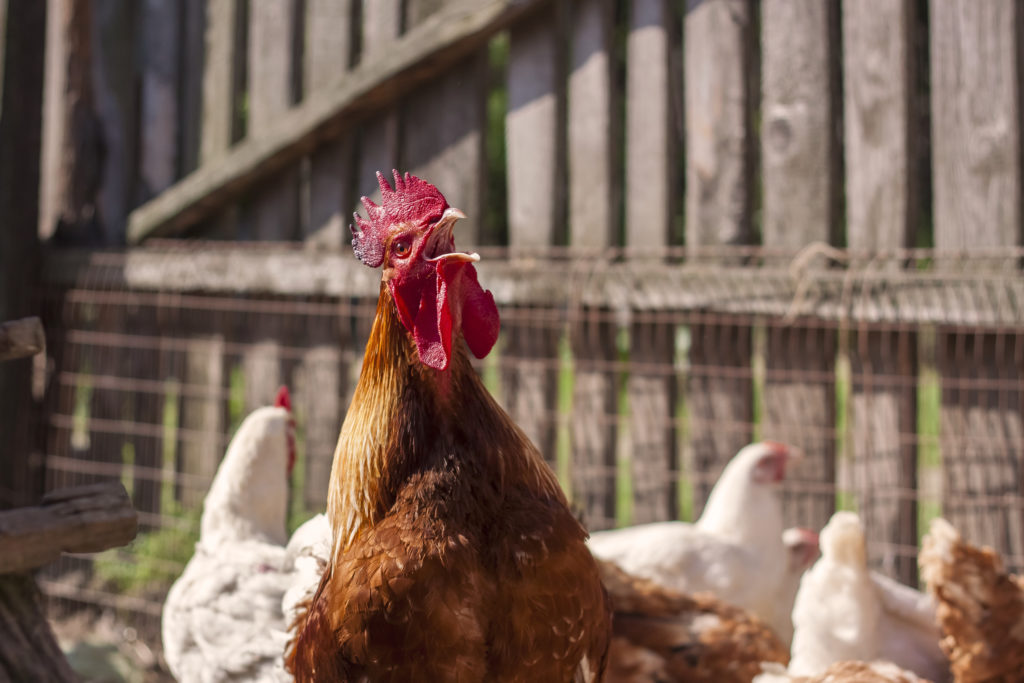
Rooster crowing. Adobe images.
I know some folks despise a rooster’s signature sound, believing it is nothing more than sleep-disturbing hullabaloo. And, yes, there will be days when your rooster first crows at 3:00 A.M. for reasons known only to him. However, I believe that the pre-dawn sounds of multiple roosters crowing across a valley signify all is right with the world and a new day, with all its glory and possibilities, is about to begin. Furthermore, these outbursts celebrate the joy of living in Rural America.
A Rooster (mostly) Eliminates Hen Squabbling
A quality rooster typically provides stability and order to a flock. Hens, by nature, are contentious creatures, always looking to move up the pecking order – or send a fellow flock mate cascading downward in the scheme of things. But a superior cock will sagely end any ruckus before it spirals out of control.
For example, on numerous occasions I have witnessed two hens squaring off over some perceived offense. And I’ve then observed Don move toward the two birds and emit loud clucking. This typically ends the brouhaha. I’ve often wondered if this type of intervention is instinctive. Does a rooster inherently know that loud noise emanating from a flock can draw predators?
Now, I’m not claiming that a roo will end all kerfuffles among contentious females, but the males, especially the older ones, do seem to have a calming influence.
A Good Roo Will Protect his Flock
Simply stated, a high-quality rooster would give his life to protect his flock. I have witnessed Don, as well as his numerous predecessors, giving the alarm note at bears, hawks, wild turkeys, squirrels, black snakes, garter snakes, toads, and butterflies. Granted, a considerable chasm exists between a bear and a butterfly and the threats that each presents, but I’ve observed our various cocks crowing and/or giving the evil eye to all these creatures and more.
Of course, even the bravest, biggest rooster is no match for any creature raccoon-size or larger. But one of the strongest instincts of a cock is to protect his flock – or go down flapping. Your flock will be safer if one of these bad boys is keeping an eagle eye out for… well… eagles.
The Alarms Vary
The alarm call can be either a high-pitched scream or shriek or boisterous clucks that are non-stop. The former danger note is typically given when a rooster spots an owl, hawk, or other airborne predator. For example, the first time I heard this sound was a number of years ago. Elaine and I had released our flock into the backyard, and the birds were contentedly foraging. Suddenly, our rooster shrieked and every hen ran into a thicket adjoining our yard. And there they stayed for over 30 minutes. The birds only returned to the yard when the rooster came out of hiding and the hens followed.
Roosters emit the repetitive clucks when non-flying creatures invade the yard. From our experience, the rooster may or may not be the first to emit the sound, but his voice will definitely be the loudest once a predator is sighted. Also of note is that you can expect to hear this alarm note several times a day. A butterfly inside the run once sent our birds into a conniption. So expect some false alarms when you hear the ground-bound predator sighting.
Understanding of Chicken Behavior
The presence of a rooster helps us understand how chickens behave and interact with each other. For example, we’ve had roosters that had favorite hens and did most of their mating with the chosen few. We’ve raised roosters who fought with their hens, who bullied their flock, who were intimidated by their hens, and one bloke, Bobby, who showed no interest in mating with them. Every single one of these males was fascinating to watch, learn from, and interact with. Simply stated, if you want to truly understand chickens, you need a rooster.
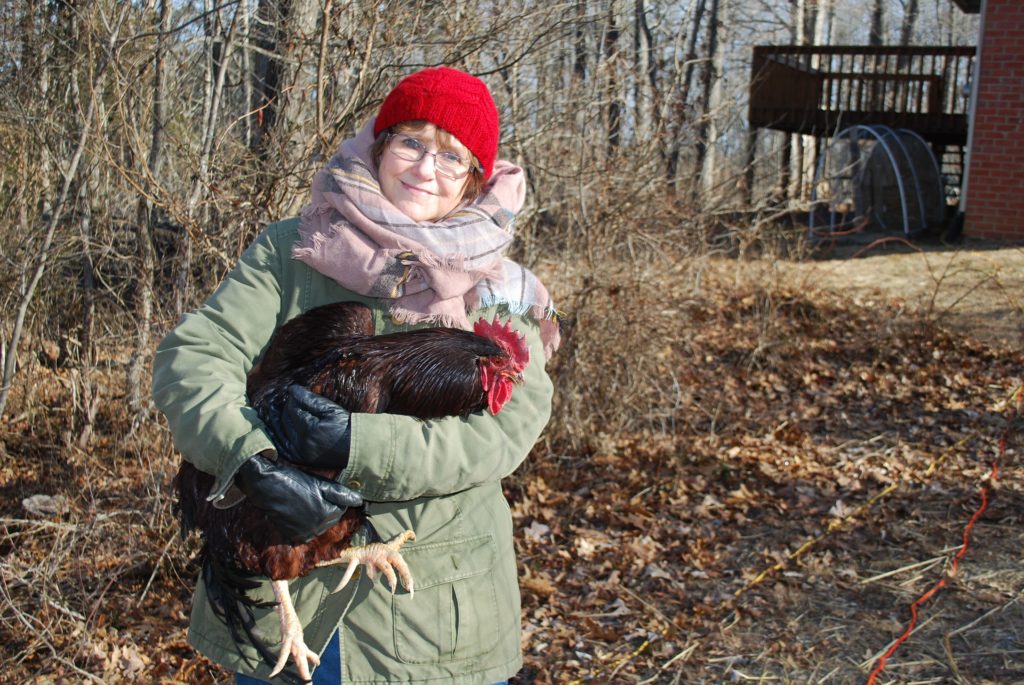
A Rooster Giving the Food Cluck Is a Delight
Want to see a show that will be better than anything you could buy a ticket for? Then throw some food item into a run with a rooster and watch and listen to the old boy emitting the food cluck. I describe this sound as a loud, enthusiastic cluck that sends every hen within an enclosure rambling as fast as they can toward the rooster. He, meanwhile, is standing over said treat, picking it up and dropping it or letting the hens take it right out of his mouth.
This display of chivalry is both amazing and fascinating to observe. We just know that deep down, the rooster wants to keep – and eat – that tidbit for himself, but he willingly shares it with his hens. I’ve had roosters, Don is one of them, who seems perfectly content to give the said treat to his ladies and expect nothing in return. Other males tried to mount the hens as soon as they stooped down to grab the offered food. Whatever a rooster’s motives are, hark to the sounds of one of these guys food clucking and prepare to enjoy the show.
A Rooster Doing the Mating Dance Is a Show Stopper
Even more pleasurable to observe is a rooster doing the old three-step, also known as the mating dance. To hopefully stimulate a hen, roos will dance approximately half-way around a female almost as if he were on his tippy toes. The hen will then kneel and allow the roo to mount her.
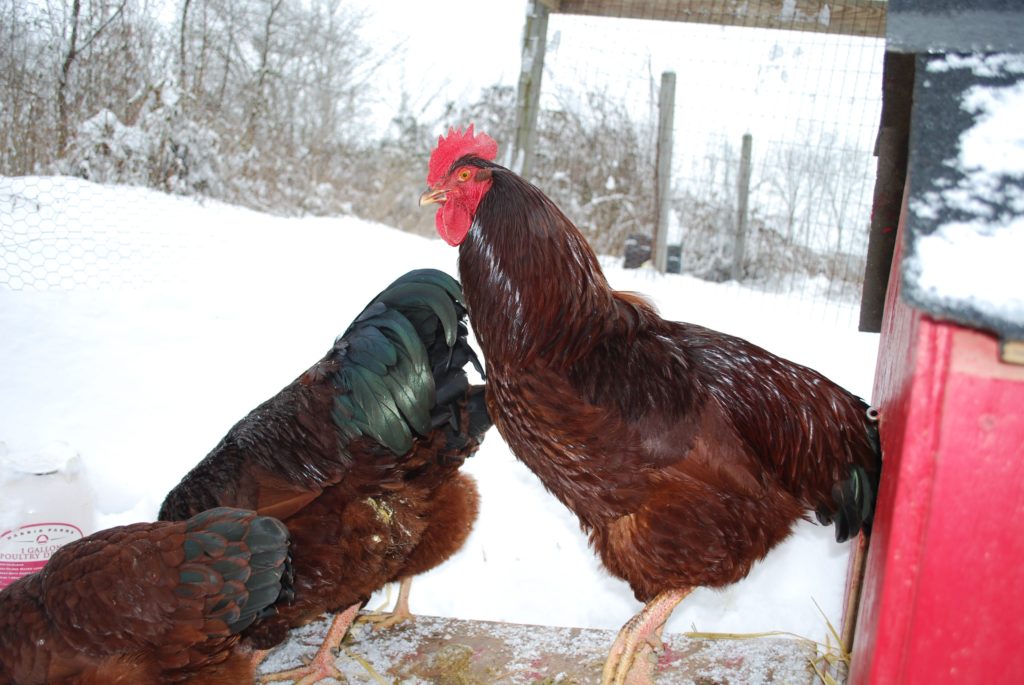
Hen signaling and rooster getting ready.
Theoretically, that’s how it’s supposed to go, but most mating dances end with a hen rejecting her suitor, and/or the rooster ambushing the hen later and mating with her. Nevertheless, the dance and the reactions of both sexes later are all interesting to watch and can teach you more about your flock’s dynamics. This is especially useful if you are interested in following a breeding program and want to mate specific roosters with specific hens.
Roosters Get a Pretty Bad Rap
Roosters receive a bad rap for many things from loud crowing to attacking anyone who comes near them or their flock. Of all the roosters we’ve ever had, only two were incorrigible. Little Jerry, an industrial Rhode Island Red, was our first roo. He was well-behaved until he was about 18 months old, when he began to attack Elaine and me. We tried modifying this behavior by picking him up and holding his head downward so that he would know who was boss.
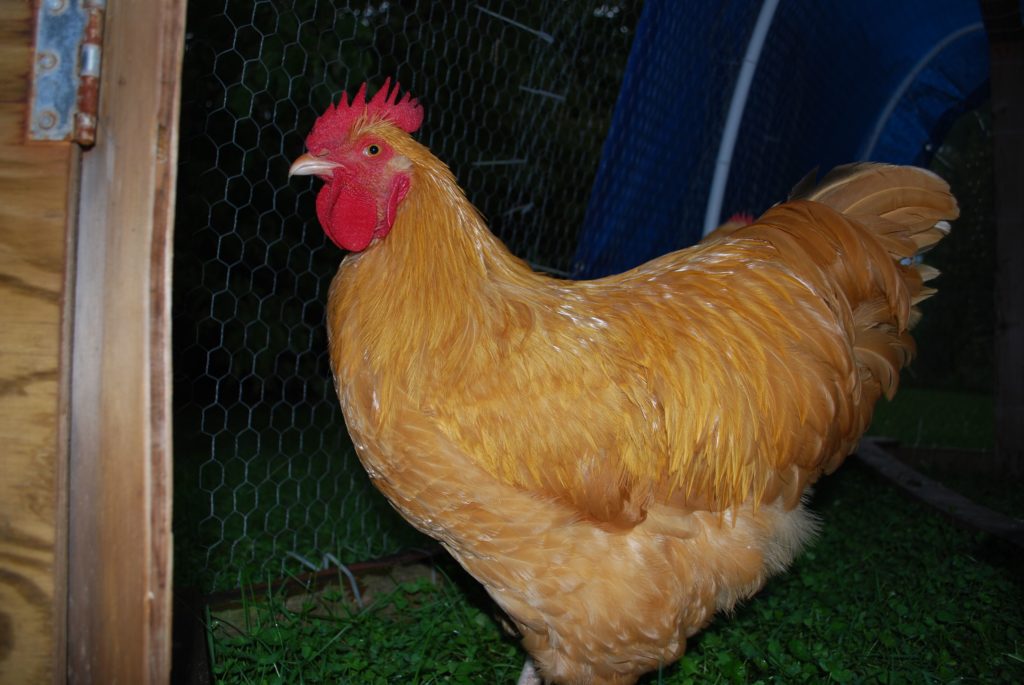
Nevertheless, some roosters still get made into stew.
Alas, that gambit and a series of others failed to curb Little Jerry’s aggressiveness, so we, to be blunt, dined on him. This should be the end result for all bad boys. From our experience of raising heritage Rhode Island Reds and Buff Orpingtons, pure-blooded roosters – for the most part- are exceptionally gentle. Of course, even heritage flocks can have roosters that are simply no good. Then it’s time to look up good chicken soup recipes.
No Rooster, No Chicks
The final reason to include a rooster in your flock may be the most obvious – no rooster, no chicks. We’ve tried lots of different ways to start a flock: buying adult or young birds, incubating fertilized eggs purchased from a hatchery, buying chicks from a feed store, and keeping a rooster and letting our hens brood their own chicks. We much prefer the last option. because it’s cheaper, cleaner (no birds inside with a heat lamp), and fascinating to watch the hen raise her young.
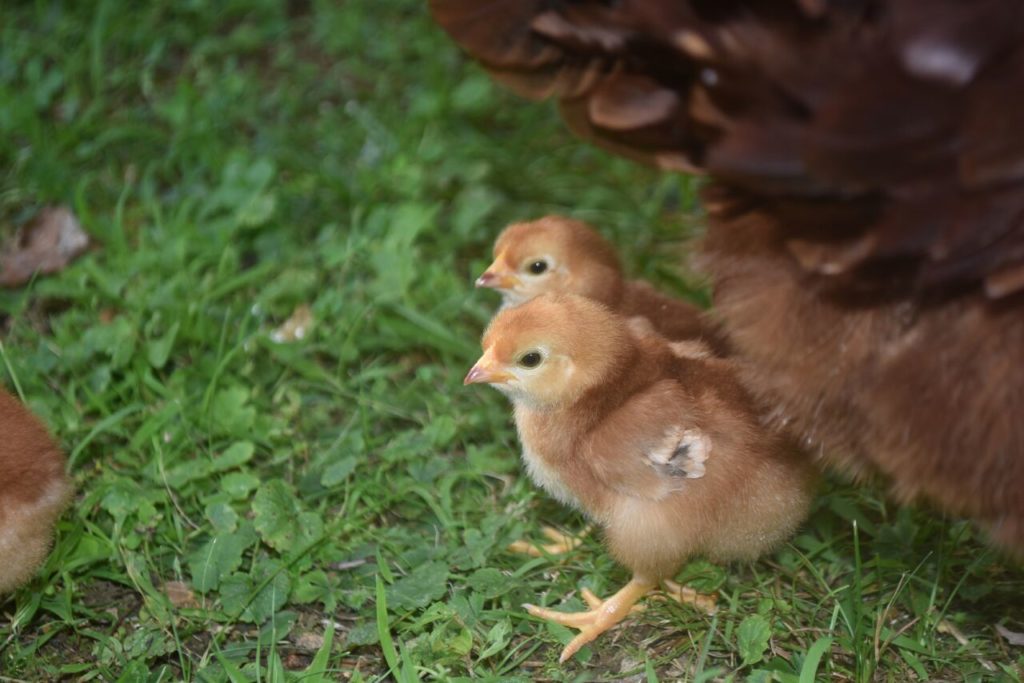
No rooster, no chicks, unless you want to buy them.
My wife and I truly enjoy roosters as part of our various flocks. Even though some of the cocks have been major disappointments, most of them have performed their duties quite well.
Bruce Ingram is a freelance writer/photographer and author of 10 books, including Living the Locavore Lifestyle (a book on living off the land) and a four-book Young Adult Fiction series on high school life. To order, contact him at bruceingramoutdoors@gmail.com. To learn more, go to his website or visit his Facebook page.













16 Comments
I ended up with a bantam rooster, he is very aggressive towards me and the hens. he attacks me whenever he gets the chance, and chases the hens away from any treats that I bring out. I have had him for about 3 years and just do not want the guilt of killing him. The hens are used to it, and will protect him from the ducks when they get after him. I would love to have a big beautiful guy but do not want the fighting that I know would come with a new rooster. He attacks my ducks also and now they are in separate pens and he still tries to get at them.
I doubt that the hens are actually trying to protect the bad rooster from the ducks. They are just showing their natural flocking instinct against the ducks, which they do not consider part of their flock, but that is just my opinion and it may or may not be correct.
Also, I am concerned about the stress that your bad rooster is causing your ducks and hens. This may cause premature death for the other fowl and also less egg laying. Chickens do not handle stress well and should not be subjected to the terrors of a bad rooster. In short, my solution for bad roosters is to slow cook them for four hours. They are delicious, and I can thus begin the process of finding a better flock leader. I would feel guilt about putting my hens an ducks through the stress of having to daily deal with that roo.
Great read, I rescued a Rooster from children who used a stick to him, I gave him 3 hens and a nice home. He’s a very naughty boy. Soon he will be my chicken broth, I am having a hard time because I’ve had him to long. But soon as weather warms up he’s gone. My new Rooster is 1 yr old and a gentleman. Thanks
You are doing the right thing by eating him. A good rooster is an outstanding part of any flock, and I am a big fan of the postives a rooster can bring. But bad roosters can be detrimental to the well being of their flocks and their owners. Those roosters should be eaten.
Virginia, thanks for the comment. I agree
Great article, and I agree emphatically!
We tried just hens for our first year, then hatched out a boy. Never got around to rehoming or eating him, and now we are up to a total of 8 handsome gentlemen. Oh sure, the middle of the night crowing happens, but our flocks are happier, and healthier. Have to keep roosters!
I have had roosters for about 12 years and currently have 2, father and son. I would rather hear a rooster crowing at any time of day than a dog barking. Barking, to me , is an angry sound, but crowing is more a celebration of life! And I do have 3 dogs.
I agree. Crowing is a very positive sound. It says all is right with the world.
I love Rooster!!
I think the Roosters are good for PET. They are smart, protect and look after hens especially they enjoy be hold by people!!
Julia, thanks for the note. Yes, roosters are a vital and enjoyable part of raising chickens.
My roo is my hero, I have even seen him flip and dispatch a snake that was interested in his human carer – me.
I am so very lucky to have ‘a real man’ in my life. he is protective. responds to my commands. and loves cuddles and tummy tickles.
Jen,
Thanks for the note. I once found a dead snake in our run. It is my belief that the rooster did the deed.
Bruce Ingram
I love my roosters I have 3. I love to hear them crowing in the morning
Yes, hearing roosters crow in the morning is a joyous event. Ours start crowing as soon as we turn on a light in the house.
Thanks for taking up for these often maligned and misunderstood guys, who are worth their weight in gold when they don’t get out of hand (as you mentioned, that’s extremely rare). Between the food clucks, outstanding and fun, to the crowing that I love and that fabulous soft shoe routine to impress the hens, Billy brings much joy to my heart. Of course, he also does it to me so I’m not sure what that indicates! His only issue is he is TOO nice with the gals and he allowed them to pick at his preening gland area until it was bleeding and missing all it’s feathers. I’m still waiting for him to body slam anyone coming after him but he doesn’t seem to want to stand up for anything involving himself, so this is a problem we have had a poor time resolving without locking him on the other side of wire from all the hens. He doesn’t seem to have any problem forcing a recalcitrant hen into mating with him so I guess he does have some get up and go but he is just basically sweet. I wouldn’t trade him for anything and I hope everyone who automatically thinks they need to get rid of a rooster who ends up being in their flock when they thought it was all females will keep them and revel in their unique natures. Thanks again!
His only issue is he is TOO nice with the gals and he allowed them to pick at his preening gland area until it was bleeding and missing all it’s feathers. I’m still waiting for him to body slam anyone coming after him but he doesn’t seem to want to stand up for anything involving himself, so this is a problem we have had a poor time resolving without locking him on the other side of wire from all the hens. He doesn’t seem to have any problem forcing a recalcitrant hen into mating with him so I guess he does have some get up and go but he is just basically sweet. I wouldn’t trade him for anything and I hope everyone who automatically thinks they need to get rid of a rooster who ends up being in their flock when they thought it was all females will keep them and revel in their unique natures. Thanks again!
Mina,
Thanks so much for your note. Roosters make a flock in my opinion.
Bruce